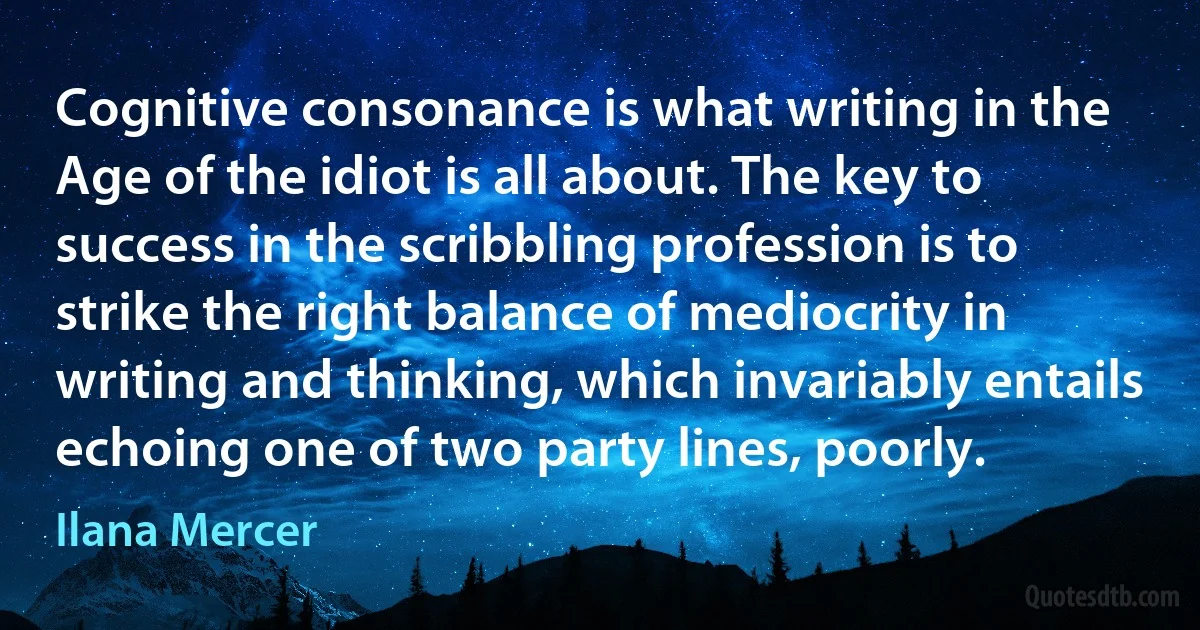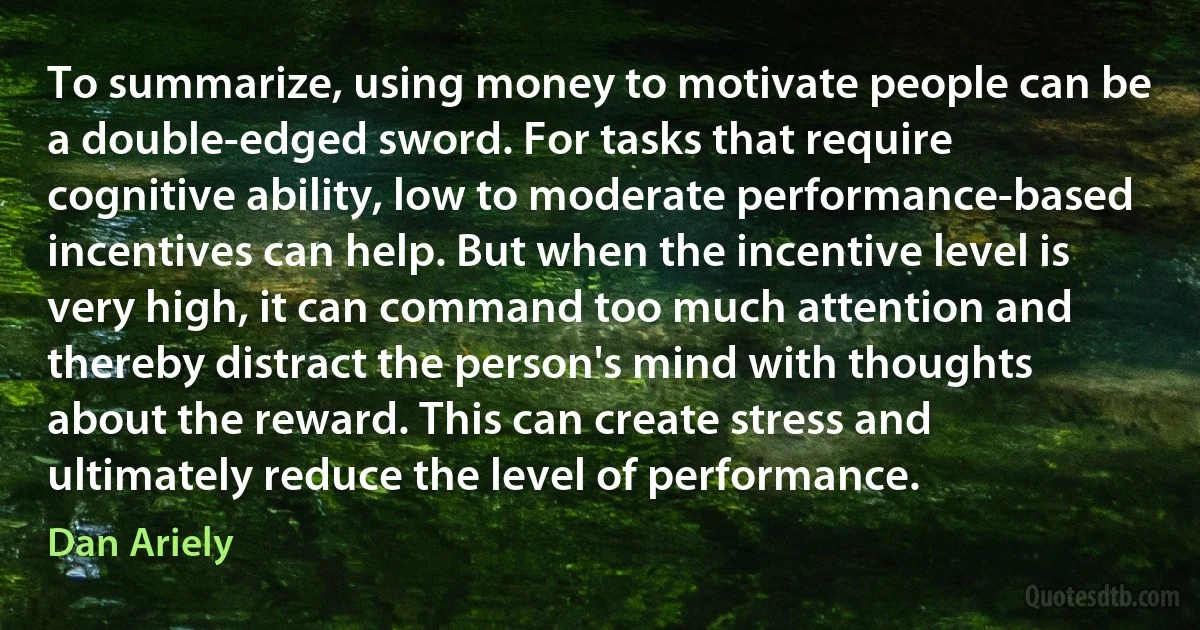Cognitive Quotes - page 4
Equality gives rise to challenging questions which are not altogether easy to answer... a = a and a = b are obviously statements of differing cognitive value; a = a holds a priori and, according to Kant, is to be labeled analytic, while statements of the form a = b often contain very valuable extensions of our knowledge and cannot always be established a priori. The discovery that the rising sun is not new every morning, but always the same, was one of the most fertile astronomical discoveries. Even to-day the identification of a small planet or a comet is not always a matter of course. Now if we were to regard equality as a relation between that which the names 'a' and 'b' designate, it would seem that a = b could not differ from a = a (i. e. provided a = b is true). A relation would thereby be expressed of a thing to itself, and indeed one in which each thing stands to itself but to no other thing.

Gottlob Frege
We must remember, during a period in history when psychology was still a branch of academic philosophy. The psychological concepts developed by philosophers of mind, such as "dominant ideas” (akin to the automatic thoughts of Beck's cognitive therapy) "habit and association” (a subjective precursor of Pavlovian conditioning), and "imitation and sympathy” (which we now call "role-modelling” and "empathy”), are as the theoretical framework upon which science of hypnotism, "neuro-hypnology”, was built.

James Braid
A specimen of research that is to be examined with the help of a microscope has first to be carefully prepared, cleaned, freed from extraneous matter, and firmly kept under the lens. In a similar way, the "bare object” to be examined by wisdom, is prepared by Bare Attention. It cleans the object of investigation from the impurities of prejudice and passion; it frees it from alien admixtures and from points of view not pertaining to it; it holds it firmly before the Eye of Wisdom, by slowing down the transition from the receptive to the active phase of the perceptual or cognitive process, thus giving a vastly improved chance for close and dispassionate investigation.

Nyanaponika Thera
The interdependence of word and idea shows clearly that languages are not actually means of representing a truth already known, but rather of discovering the previously unknown. Their diversity is not one of sounds and signs, but a diversity of world perspectives [Weltansichten]. ... The sum of the knowable, as the field to be tilled by the human mind, lies among all languages, independent of them, in the middle. Man cannot approach this purely objective realm other than through his cognitive and sensory powers, that is, in a subjective manner.

Wilhelm von Humboldt
We may usefully think of the language faculty, the number faculty, and others as 'mental organs,' analogous to the heart or the visual system or the system of motor coordination and planning. There appears to be no clear demarcation line between physical organs, perceptual and motor systems and cognitive faculties in the respects in question.

Noam Chomsky
I hope I have seduced the reader to consider that we have in front of us the possibility of an open-ended quest for resonant passages between human experience and cognitive science. The price however is to take first-person accounts seriously as valid domain of phenomena. And beyond that, to build a sustained tradition of phenomenological examination that is almost entirely nonexistent today in our western science and culture at large.

Francisco Varela
Personal computers will make our future adult population simultaneously more mathematically able and more visually literate. Ten years from now, teenagers are likely to enjoy a much richer panorama of options because the pursuit of intellectual achievement will not be tilted so much in favor of the bookworm, but instead cater to a wider range of cognitive styles, learning patterns, and expressive behaviors.

Nicholas Negroponte
Philosophy and cognitive science have contributed to the advancement of the object model. The idea that the world could be viewed either in terms of objects or processes was a Greek innovation, and in the seventeenth century, we find Descartes observing that humans naturally apply an object-oriented view of the world. In the twentieth century, Rand expanded upon these themes in her philosophy of objectivist epistemology. More recently, Minsky has proposed a model of human intelligence in which he considers the mind to be organized as a society of otherwise mindless agents. Minsky argues that only through the cooperative behavior of these agents do we find what we call intelligence.

Grady Booch
Systems philosophy first must find out the "nature of the beast" This is the question of what is meant by "system", and how systems are realized in reality in various levels of observation. In Laslo's terms, this is the methodology and theory of natural systems. Secondly, there is epistemology, i. e. the methodology and theory of cognitive systems.

Ervin László
My early work was philosophic, what would be called epistemology, I was convinced I'd dicredited cognition. When somebody says that all statements are false, the obvious problem is that as an assertion it's self-defeating. I had to find a way to frame this insight which was not self-defeating and that's in "Blueprint", the essay entitled "The Flaws Underlying Beliefs." One has to do what Wittgenstein claimed to do in the "Tractatus Logico-Philosophicus," which is to use the ladder and then throw it away. The way I devolved, moved out from, this position of strict cognitive nihilism, was with the idea of building a new culture which would depart profoundly from the scientific culture in which we live.

Henry Flynt
Doubts about the existence of free will and individuals are nothing new, of course. More than 2,000 years ago thinkers in India, China and Greece argued that ‘the individual self is an illusion'. Yet such doubts don't really change history much unless they have a practical impact on economics, politics and day-to-day life. Humans are masters of cognitive dissonance, and we allow ourselves to believe one thing in the laboratory and an altogether different thing in the courthouse or in parliament. Just as Christianity didn't disappear the day Darwin published On the Origin of Species, so liberalism won't vanish just because scientists have reached the conclusion that there are no free individuals.

Yuval Noah Harari
The Freudian tradition will never completely die because it has a few good points. For example, people have motives and thoughts of which they are unaware. Most of cognitive therapy has now adopted a similar idea. On the other hand, the relationship part of psychoanalysis - where you must have a deep, emotional relationship with the client - will, I think, get kicked in the teeth one of these days.

Albert Ellis

![[This view is contrasted with all forms of Empiricism, by which it is] assumed that development is uniform across (cognitive) domains, and that the intrinsic properties of the initial state (of the mind) are homogeneous and undifferentiated - an assumption found across a spectrum reaching from Skinner to Piaget. (Noam Chomsky)](https://cdn.quotesdtb.com/img/quotes_images_webp/08/noam-chomsky-across-assumption-276408.webp)

